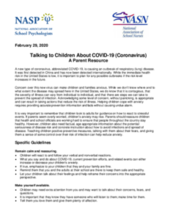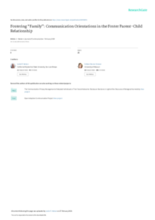Displaying 781 - 790 of 2509
This resource provides specific guidance to parents on how to talk to children about, and help them understand, the COVID-19 crisis.
This comic is based on a radio story that NPR education reporter Cory Turner did. He asked some experts what kids might want to know about the new coronavirus discovered in China.
The present study investigated the relationship of current foster parents’ communication with his/her foster child on foster parents’ perceptions of relational and child well-being.
In this pilot study, sixteen youth between ages 18 and 20 participated in semi-structured interviews, support mapping, and resiliency measurements to gather the experiences of the transition from foster care.
This study draws on data from the [STUDY] and the National Student Clearinghouse to examine the roles that Education and Training Vouchers (ETVs) and campus support programs (CSPs) play in promoting college persistence for foster youth.
This article discusses the implications of the influx of parents into the child welfare system for welfare authorities, using the U.S. state of Florida as an example.
"Children in Maryland's foster care system are languishing in psychiatric hospitals even when they no longer require hospital care," says this segment of NPR's Weekend Edition Saturday. "The state doesn't have enough space to place them elsewhere."
The purpose of this study was to describe the demographics, state-dependent living situations, and juvenile detention usage of state-dependent commercially sexually exploited youth.
Using a sequential, mixed methods approach, data from 115 sexually active African American youth in foster care (17-20 years old) were analyzed to determine their level of protection and whether gender was a factor in their prevention efforts.
In this opinion piece for Youth Today, Benjamin Bencomo - an assistant professor of social work at New Mexico Highlands University - writes about his experience as a social worker supporting an Indigenous young person as he aged out of foster care and how he learned to allow the young person to define his own goals for a successful transition to adulthood.


